
2759_7_am_k_7_2015
.pdf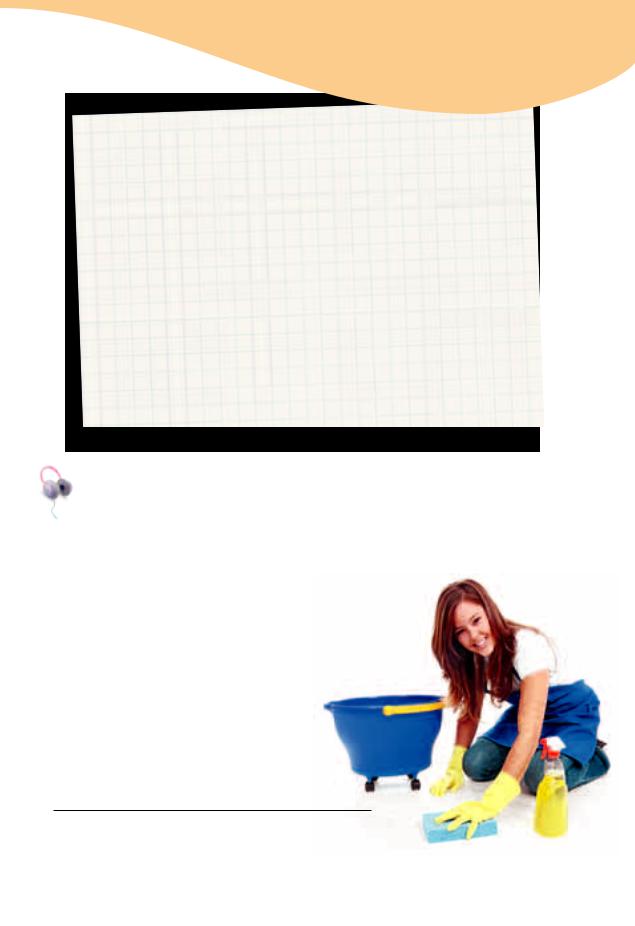
Lesson 1
4In my room there are many things: a books, CDs, shoes, pillows.
b clothes, books, notebooks, toys.
|
c |
................................. |
. |
|
|
d |
|
|
|
|
windows, chairs, lamps |
opposite the bed. |
||
5 |
In my room, the desk |
is: a |
||
|
. |
|||
|
|
|
b |
in front of the bed |
|
|
|
c |
.................................behind the bed. |
|
|
|
d |
|
6In my room, the posters are: a above the bed.
b on my desk.
c |
................................. . |
|
d |
||
I haven’t got posters in my room |
8 Listen and sing the song.
Do it now
When you have a job that’s not much fun,
And you wonder when you’ll get it done,
Don’t wait till later — time may not allow!
Don’t wait till later — do it now!
When you have some work that’s not much fun,
A job to do before the day is gone,
Don’t wait till tomorrow — better not delay1!
Don’t wait till tomorrow —
do it today!
1to delay [di9lei] — затримувати, розтягувати в часі
51
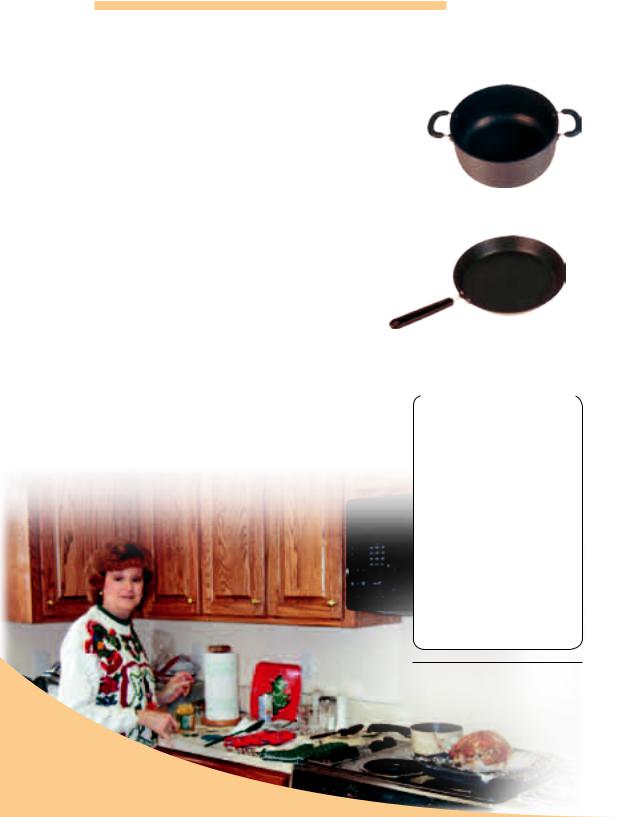
Reading 
1 Read and explain why a woman’s work is never done.
HOUSEHOLDING CHORES
Doing a work about the house is often called ‘doing chores’. Doing chores helps a family to ‘hold their house’ or in other words ‘to household’. Usually a member of a family has a householding duty. It means he or she has a part of chores to do. There are the things like feeding a pet, cleaning the carpets or doing shopping…
On weekends my friend’s family members are rarely all at home at the same time, so they write notes to each other. They help them to remember things to do.
My mother is the busiest person in the householding chores. And I must admit1 my elder sister is the greatest helping hand for her.
a pan [p2n]
a frying pan
[9fraiN p2n]
Vocabulary Box to boil [bcil]
to cut [kyt] to dry [drai] to fry [frai] to pour [pc:]
to prefer [pri9fE] to serve [sE:v] zzto do chores zzto do
householding (duties)
1to admit [Cd9mit] — визнати
52
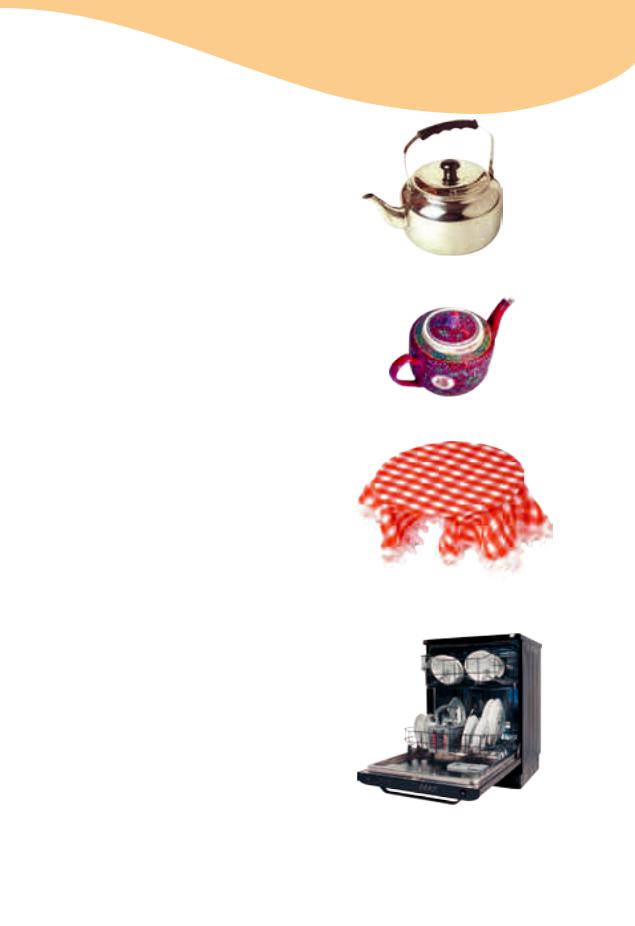
Every morning mother cooks breakfast. She fries some eggs in the frying pan. My sister sometimes boils sausages in a small pot. When the eggs are ready, mum serves them to us with nicely-decorated salad and boiled sausages. While my mother is doing that, my sister is cutting some bread and taking out the tea pot, cups and plates.
When the water in the kettle boils, my sister puts some tea into the teapot, pours some of the boiling water into the pot and the tea is ready.
Sometimes my mum prefers coffee to tea. Then my father prepares it. He is good at making coffee. I never drink coffee. I prefer tea. My sister sometimes drinks coffee with milk or cream. After breakfast I go to my school and my father goes to his office. My sister washes up the dishes and dries them with the dishwasher machine. My mum cleans the table and takes off the tablecloth.
My sister puts clean cups and dishes onto the cupboard and goes to her job.
And what about mum? She stays at home and does lots of things about the house. There is always something to do, a woman’s work is never done…
Lesson 1
a kettle [9ketl]
a teapot [9tI:pAt]
a tablecloth
[9teiblklAO]
a dishwasher [9diSwASC]
53

2Say if it is true or false.
1 Everyone must know that he has to do his or her part of chores. 2 Doing shopping is not a householding duty.
3 The elder sister is usually the greatest helping hand for mother.
4 We usually boil sausages in a frying pan.
5 We usually fry in kettles.
6 To make tea we need a kettle and a tea pot. 7 His father is good at making coffee.
8 His elder sister never drinks coffee.
9 After breakfast father washes up with a dishwasher.
10 Mother cleans the table after breakfast.
11 The elder sister stays at home and does lots of things about the house.
Learning Tip
New Words
When you read or listen to some information in English, there are often words that you don’t know. Here is a piece of advice for you:
1Don’t worry. You can understand a lot, even if you don’t know all the words.
2Try to understand the meaning of new words from the context. Don’t stop listening or reading.
3 After the lesson use a dictionary to look up the new words.
Write them down in your vocabulary notebook.
4 Try to learn some new words each week.
3Complete the sentences according to the text above.
1 Doing a work about the house is called … 2 Usually each member of a family has a …
3 Writing notes to each other helps family members to … 4 Usually mother is the busiest person in …
5 We can … or … eggs for breakfast.
54

Lesson 1
6 When dish is ready we can …
7 To make tea we should …
8 We can wash up and dry the dishes with …
9 We should put clean dishes …
10 A woman’s work is …
4Work in groups. Speak on the following.
1 Have you got a householding duty? What is it?
2 What householding duties do other members of your family have?
3 Is your mother the busiest person in doing chores? Prove that. 4 Who is the greatest helping hand for your mother?
5 Have you got any machines to help in householding?
6 Do you write notes to each other to remember things to do? 7 What does your morning look like?
8 Can you make tea? How do you do it?
5 Read the note and answer the questions.
Do you know?
In Great Britain, people usually work five days a week.
Many of them also work at home at the weekend. They do the chores and gardening. They also do repairs1 and make improvements2 to their houses. This is called DIY
(Do It Yourself). The British love DIY because they are very proud of their homes.
zzDo people in Great Britain work at the weekend? zzWhat is the attitude of the
British to their homes? zzWhat is called DIY?
1a repair [ri9pe3] — ремонт |
2an improvement [im9pru:vm3nt] — покращення |
55

6 Listen and read the poem, then answer the questions.
WHEN MUMMY IS AWAY
I’d like to tell you all about A very stormy day,
When Daddy stayed at home with me
While Mummy went away.
He made the beds and swept the floor, And did the washing up.
(And do you know, he broke a plate,
Two saucers and a cup.)
Then, when he bathed me, after tea,
He taught me how to swim.
(And there were puddles on the floor, And drips all over him!)
The Mummy came home just in time
To see me getting down.
“Next time I’ll stay at home,” she said,
“While Daddy goes to town.”
zzHave you ever stayed at home without mother? zzIf yes, what did you usually do?
zzDid you cook?
zzDid you do something about the house / flat? zzHas anybody taught you cooking?
zzHave you ever had the situation like the one described in the poem?
56
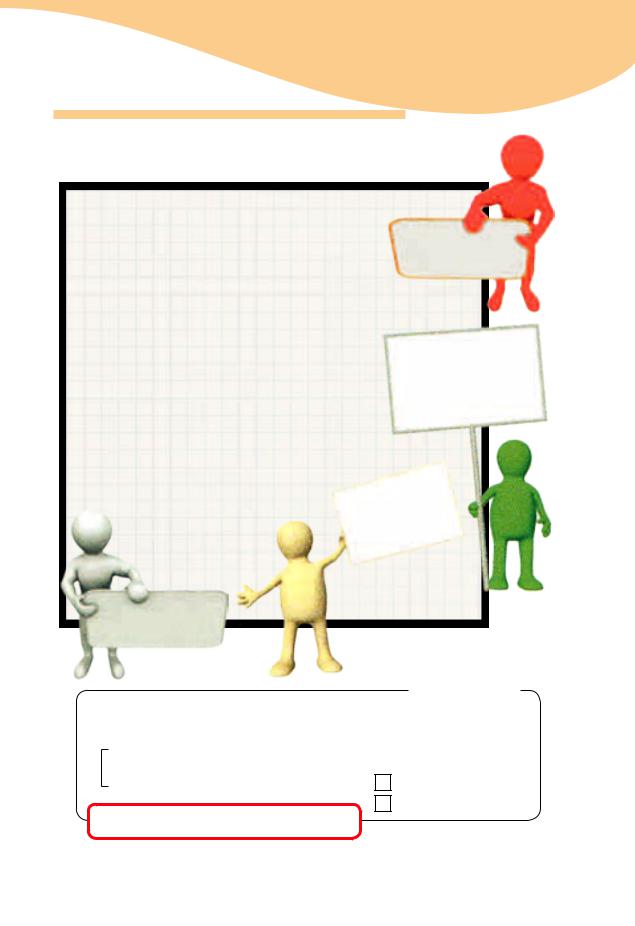
Lesson 1
Grammar 
1Read the mini story and choose the sentence which best sums it up.
EVERYBODY, SOMEBODY, ANYBODY
AND NOBODY
This is a story about four people called
Everybody, Somebody, Anybody and Nobody. They had a very important job to do. Everybody was sure Somebody would do it. Somebody thought Anybody could do it. Nobody did it in the end which made Everybody very angry.
aIt’s best to tell other people to do your job.
b Don’t expect other people to do your job.
c People always do their job.
ANYBODY
EVERYBODY
NOBODY
SOMEBODY
Remember!
+ Somebody is at the door.
?Is anybody at the door?
–There isn’t anybody at the door.
There is nobody at the door.
Read § 5, p. 198; § 2, pp. 209-210
There are no double negatives in English in one sentence.
– verb + any … + verb + no …
57

2 Put in ‘somebody’ / ‘nothing’ / ‘anywhere’ etc. |
|
||
1 |
It’s dark. I can’t see |
........................anything |
|
2 |
Tom lives somewhere |
near London. |
|
|
........................ |
|
|
3 |
Do you know ........................ |
about computers? |
|
4 |
‘Listen!’ ‘What? I can’t ........................hear |
’ |
|
5 |
‘What are you doing here?’ ‘I’m waiting for ........................ |
’ |
|
6 |
‘What’s wrong?’ ‘I’ve ........................got |
in my eye.’ |
|
7 |
‘Did ........................ |
see you?’ ‘No, ........................’ |
|
8 |
They weren’t hungry, so they didn’t eat ........................ |
|
|
9 |
‘What is going to happen?’ ‘I don’t know. ........................ |
knows.’ |
|
10 |
‘Do you know ........................ |
in London?’ ‘Yes, I’ve got a few |
|
|
friends there;’ |
|
|
11 |
‘What’s in that cupboard?’ ........................‘ |
It’s empty’ |
|
12 |
I’m looking for my lighter. I can’t find it ........................ |
|
|
3 Complete the table with the words: places, people, things.
|
+ |
– ? |
– |
1 .......... |
somebody/someone |
anybody/anyone |
nobody/no one |
2 .......... |
something |
anything |
nothing |
|
|
|
|
3 .......... |
somewhere |
anywhere |
nowhere |
4Choose the correct word in each sentence.
1 It was so boring at the party that (everybody / anybody) left.
2 I’ve looked (nowhere / everywhere) for my mobile phone but I haven’t found it.
3 I’m hungry. Let’s go and get (anything / something) to eat.
4 Are you going (nowhere / anywhere) this weekend?
5 He’s such a nice person that (somebody / everybody) likes him. 6 There’s (nothing / anything) interesting on at the cinema at the
moment.
7 (Somebody / Anybody) broke the mirror in the bathroom.
8 — Where are you going tonight? — (Somewhere / Nowhere). I’ll be at home.
58
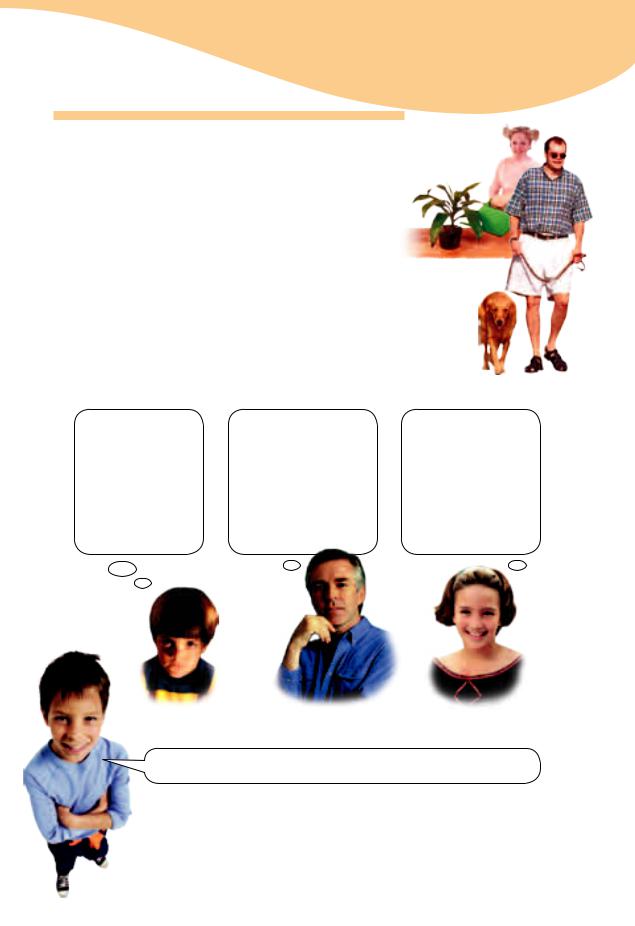
Lesson 1
Speaking 
1Work in pairs. Have a talk about the duties at home.
A:Who waters the plants at your home?
B:Sometimes I do, sometimes my sister does.
A:And who usually walks your dog?
B:My father does.
|
|
|
|
always |
|
|
air the room, do shopping, do the |
|
|
|
|
|
ironing, cook dinner, do the washing |
|
|
usually |
|
|
up, tidy the room, sweep the floor |
|
|
sometimes |
|
|
|
|
|
never |
|
|
|
|
|
|
|
2 Look and say how the Robinsons feel about their duties.
To feed and |
Well, shopping as |
To wash up the |
walk the dog? |
usual. It’s OK. |
dishes? I’ve |
Why me again? |
And no cooking. |
already done it. |
To make my |
That’s great! Now |
Now I can help |
bed? That’s |
I can fix Jane’s |
Dad with the |
really boring. |
iPod at last. |
shopping. |
Tim Robinson |
Mr Robinson |
Liz Robinson |
I think Mr Robinson likes shopping but doesn’t like…
59
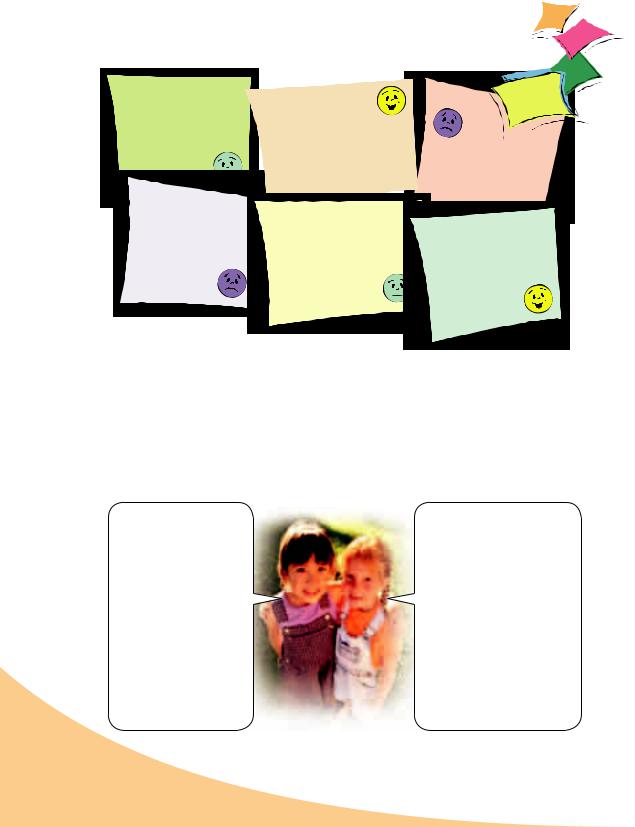
3 а) Read and think what words Jane may say.
Jane’s mother went away for the weekend.
She left sticky notes with the instructions for her daughter.
Make your bed and tidy your room
Do your homework now
Phone |
for a |
|
|
|
There is |
||||
. |
||||
pizza |
|
|
on |
|
some money |
||||
|
||||
the kitchen |
table |
|||
|
|
|||
Cook some |
|
|||
spaghetti. |
The |
|||
sauce is in |
|
|
||
the fridge |
|
|
||
Wash the dirty clothes
Take the video back to the video
club
b) Role-play the telephone talk the
mother and the daughter had in the evening. Work in pairs.
A is mother. She asks about the things Jane had to do.
B is Jane. She tells mum about the things she has or hasn’t done.
4 Express your opinion as for the girls’ attitude to the housework.
I think that parents shouldn’t ask their children to do housework. They are going to do it when they get older. I hate cooking and cleaning. They are really boring.
And I enjoy helping mum with cooking and with cleaning the house. It’s wonderful to do something with your own hands. I’m sure that doing housework will give me good experience for the future.
60
